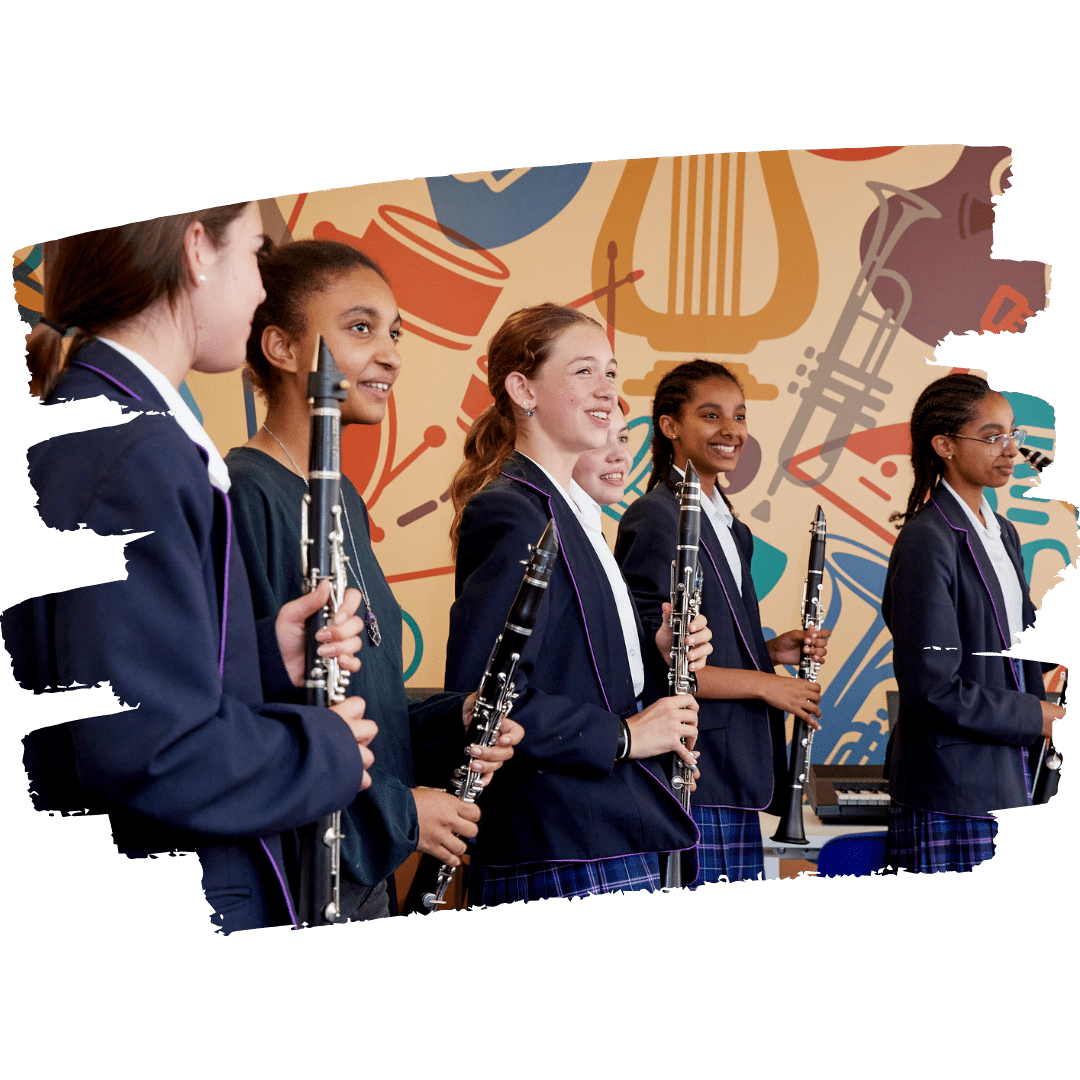Music (Year 7)


See Year 7s Music ‘Schedule of Learning’ for the 2025/26 academic year
| Topic | Sub-topic |
|---|---|
| Welcome to Music dept | What does everyone play? MAT test; rhythm games; singing |
| Elements of Music / Instruments of the orchestra; Learning a musical for the Yr 7 Concert | Introduce an element; BBC Orchestra of Wales – section of orchestra; start learning the chosen musical |
| Elements of Music / Instruments of the orchestra; Learning a musical for the Yr 7 Concert | Introduce a different element/s; BBC Orchestra of Wales – a different section of orchestra; continue learning the chosen musical |
| Elements of Music / Instruments of the orchestra; Learning a musical for the Yr 7 Concert | Introduce a different element/s; BBC Orchestra of Wales – a different section of orchestra; continue learning the chosen musical |
| Elements of Music / Instruments of the orchestra; Learning a musical for the Yr 7 Concert | Introduce a different element/s; BBC Orchestra of Wales – a different section of orchestra; continue learning the chosen musical |
| Elements of Music / Instruments of the orchestra; Learning a musical for the Yr 7 Concert | Introduce any elements not previously covered; Revision of Instruments of the Orchestra; final rehearsals for Year 7 Concert |
| Elements of Music | Body Percussion / Timbre compositions |
| Graphic Scores | Complete Train pieces; introduction to Haunted House Topic |
| Lilac feedback sheets – Timbre pieces; Haunted House and Graphic Scores | Work on Haunted House composition |
| Haunted House (and Graphic Scores) | Work on Haunted House composition |
| Haunted House (and Graphic Scores) | Work on Haunted House composition |
| Rhythm & Pitch | Update what everyone plays; Introducing rhythm – time signatures, duration; rhythm games; aural dictation |
| Lilac feedback forms – Haunted House compositions; Rhythm & Pitch | Continue with rhythm – time signatures, duration; rhythm games; aural dictation |
| Rhythm & Pitch | Continue with rhythm; introduce pitch |
| Rhythm & Pitch | Continue with rhythm; continue with pitch notation |
| Rhythm & Pitch; Keyboard Skills | Continue with rhythm & pitch notation, aural dictation; introduce keyboard skills project |
| Rhythm & Pitch; Keyboard Skills | Continue with rhythm & pitch notation, aural dictation; introduce keyboard skills project |
| Rhythm & Pitch; Keyboard Skills | Continue with rhythm & pitch notation, aural dictation; introduce keyboard skills project |
| Rhythm & Pitch; Keyboard Skills | Continue with rhythm & pitch notation, aural dictation; introduce keyboard skills project |
| Rhythm & Pitch; Keyboard Skills | Rhythm & Pitch Test; Complete keyboard skills |
| Medieval Music | Intro to Medieval Music – Sumer is icumen in; medieval instruments ppt |
| Medieval Music | Intro to Song of the Donkey and arrangement techniques |
| Medieval Music | Update what everyone plays; Work on Donkey Song arrangements |
| Medieval Music | Work on Donkey Song arrangements |
| Medieval Music | Work on Donkey Song arrangements |
| Summer Listening Examination | Summer listening examination (no revision required) |
| Y7 exams (Wed, Thurs, Fri – English, Maths, Science) | |
| Lilac feedback forms – Medieval arrangements; Garageband Project | Introduce Garageband project |
| Garageband Project | Work on Garageband project; singing |
| Garageband Project | Work on Garageband project; singing |
| Garageband Project | Work on Garageband project; singing |
| Garageband Project | Complete Garageband Project |
What will you study?
- Music
- The Elements of Music
- The Instruments of the Orchestra
- Preparation for a Year 7 Concert (singing)
- Haunted House composition
- Graphic scores
- The Elements of Music
- The Instruments of the Orchestra
- Preparation for a Year 7 Concert (singing)
- Haunted House composition
- Graphic scores
- Traditional notation – rhythm & pitch
- Keyboard Skills
- Medieval Music
- Singing
- Developing Music ICT skills – Using Garageband
Useful tips and resources
• Explore as much music as possible through performing music, listening to music & experimenting with composing music
• There are many books on different types of music and music-making in the school library
• There are many resources on the SHS Music Resources Team on MS Teams
• There are numerous places online to explore different styles of music including Spotify, YouTube, Apple Music etc
• Wider listening / reading around the topics studied in lessons will enhance understanding – books, magazines, listening to the radio / podcasts, attending concerts, exploring the web will all be beneficial
What super curricular activities can KS3 students engage with at school?
• Aim to get involved in the co-curricular musical life of the school – there are a wide range of musical activities including choirs, orchestra, rock bands, various ensembles, music theatre etc – see the school ‘Co-curricular booklet’ for further details
• Consider taking up a musical instrument / having singing lessons – we have a number of visiting music teachers
• If you already play an instrument, keep going!
• Aim to attend / take part in some of the concerts, formal and informal, that take place throughout the school year (there is at least one concert every half term)
• Many students learn an instrument / have singing lessons outside school
• There are all sorts of musical ensembles that you can join outside school including bands, orchestras, church choirs etc
• If you play an instrument / have singing lessons, you may want to consider taking part in the activities organised by the local borough that you live in; e.g. the Merton Music Foundation or Sutton Music Trust
• Consider going to live concerts – there are many options in London such as the South Bank Centre, which features concerts of many different styles of music including free events and events that you can take part in
• The BBC Proms takes place every summer in The Albert Hall – all the concerts are on BBC Radio 3 and some are televised (or you could go and see the music live)
• Explore different styles of music on places like Spotify and YouTube
